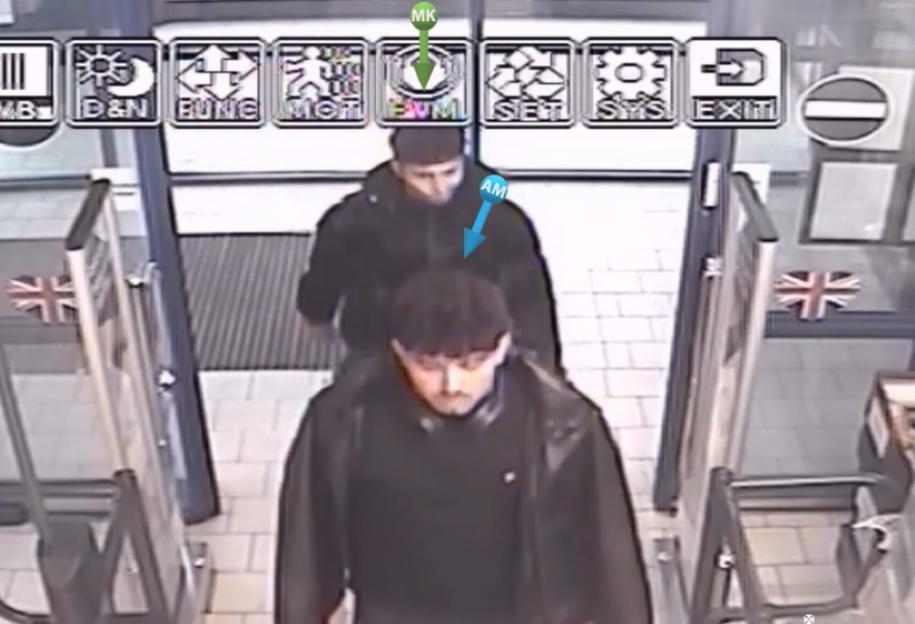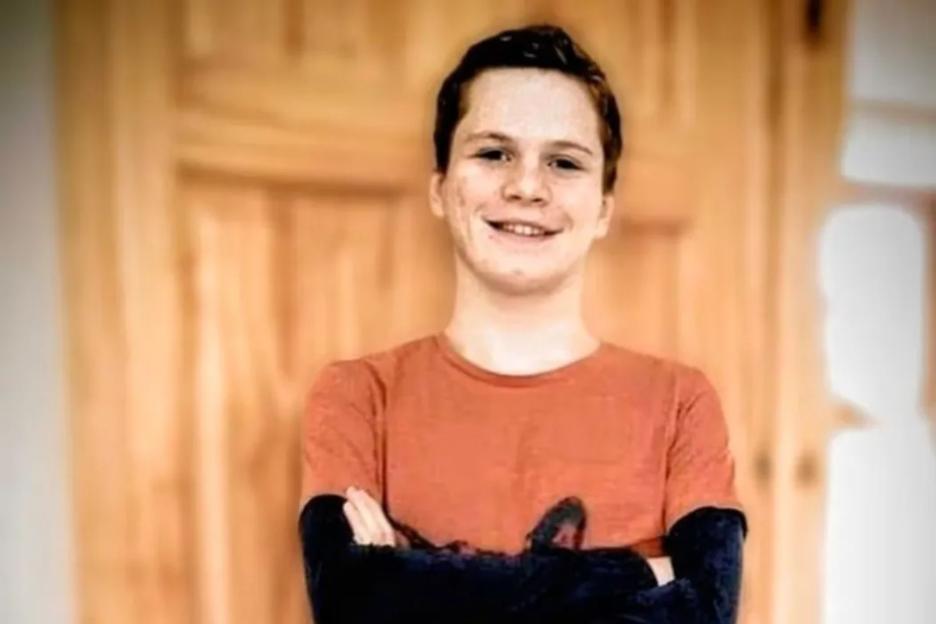A LOVING mum with an infectious smile, it was unthinkable that Tina Bauld would be chased down and stabbed to death by a drug-fuelled knifeman outside her leafy village home.
But what was just as shocking as Tina’s brutal stabbing was the identity of her killer – her own 22-year-old son, Gregor Bauld, whom she’d given a “comfortable and happy” childhood.
 Gregor Bauld stabbed his mum Tina to death
Gregor Bauld stabbed his mum Tina to death
 Tina, here with son Gregor, is one of an alarming number of British mums killed by their sons
Tina, here with son Gregor, is one of an alarming number of British mums killed by their sons
 Former Eton College master Matthew Corry killed his 84-year-old mother
Former Eton College master Matthew Corry killed his 84-year-old mother
 Beatrice Corry phoned the emergency services as her son beat her
Beatrice Corry phoned the emergency services as her son beat her
Bauld, a “well brought-up” young man, was his mum’s only child.
Tina, 55, had lavished her son with love – yet she horrifically died in the arms of her husband, Tom, after Bauld launched the frenzied attack in Burbage, Leicestershire, last year.
“This killing was awful, beyond imagination,” a judge later told Bauld.
“It was a brutal, shocking taking of life. Your mother died in the road outside your house, and her house, with your father next to her, as life expired with you watching on.”
Tina is among an alarming number of British mums being butchered by the children they adore – with new figures revealing more women are killed by their sons than by strangers.
While some have been knifed up to 100 times or bludgeoned with household objects, others are being beheaded, set ablaze, and strangled with electric cables by their beloved boys.
Of 122 women killed by men in the UK in 2022, 12 of them – a huge 10 per cent – were slaughtered by their sons, according to a report by the campaign group, Femicide Census .
In contrast, 11 were killed by someone they didn’t know.
Experts tell The Sun that the killing of mothers by their sons remains an “invisible” issue – despite Britain having witnessed more than 170 harrowing cases over the past 15 years.
Such instances of matricide – the killing of one’s mother – are “symbolic: not just ending a life but obliterating the source of life and authority”, says behavioural criminologist Alex Iszatt.
She adds: “Matricide is rarely a ‘snap’.”
Often, such killings involve .
Bauld, a schizophrenic, was delusional. He believed mum Tina – who had gushed about her “handsome” son on social media – was an “alien” and a “paedophile”, a jury heard.
Manic episodes
In another sickening case, a former Eton College master plagued by mental health issues kicked, stamped on, and in the Cotswolds.
, who had stayed in a secure facility three times previously due to manic episodes, killed 84-year-old Beatrice Corry in 2023, while she desperately called 999.
 Corry had previously had suffered from manic episodes
Corry had previously had suffered from manic episodes
 The killing left the quiet Cotswolds town in shock
The killing left the quiet Cotswolds town in shock
Beatrice’s grieving family later paid tribute to the “utterly dedicated” mother, and described the killing of caring mothers by their sons as an “often overlooked [type of] homicide”.
“Many killers show signs of untreated schizophrenia, psychosis, or severe personality disorders,” Alex tells us.
“In psychosis, the mother can become an impostor, a witch, a malevolent force.
“Killing her feels like righteous self-defence. In antisocial personality disorder, the calculation is colder: she’s simply an obstacle to remove.”
I think [Mum] felt like a failure, like she hadn’t been a good mum
Sister of violent brother
While a disturbing number of British women are being killed by their sons, far more are suffering severe – and, often, secret – at the hands of their treasured children.
One daughter, living in England, recalls how her brother became “incredibly violent” towards their mum during his teens, hitting her and even threatening her with a kitchen knife.
“It wasn’t physical straight away,” the daughter tells The Sun, speaking anonymously.
“It was sort of mindset games. He was tall, so he’d really square up to her.
“She’d be with her back against the wall, and he’d be in her face. You know when someone’s that angry that they’re spitting and bright red? It was terrifying, to be honest.”
The woman adds: “It started with him grabbing her, then he slapped her a couple of times.
“He [also] threatened her with a knife from the kitchen.”
Concerned about the “very loud” noise coming from the family’s home, nestled in an affluent part of the country, their neighbours eventually knocked on the door.
 Anarlyn Jones phoned the police and confessed to having murdered his mum
Anarlyn Jones phoned the police and confessed to having murdered his mum
 Anna Jones was killed by a slash to the throat
Anna Jones was killed by a slash to the throat
 The incident happened in their home in Hampshire
The incident happened in their home in Hampshire
But the daughter says her mum “played everything down”.
“I don’t think she really told anybody,” she says, adding that her dad – who worked long hours, away from home – was never there when her brother lashed out at their mum.
“I think there was definite embarrassment and shame,” she recalls.
“I think [Mum] felt like a failure, like she hadn’t been a good mum.
“We lived in quite a ‘well-to-do’ area. You just didn’t air your family’s problems.”
Death threats & theft
Other mums have described receiving death threats, being strangled, stamped on and verbally abused, and having cash and jewellery stolen from them by their sons.
Trapped by fear, or a deep love for their boys, many don’t report the violence. Others find the courage to – but are met with inadequate support, with one mum telling the BBC there is “only so many times you can be told by social services, ‘There’s nothing more we can do’”.
I’ve killed my mum…
Anarlyn Jones
But when such abuse escalates, it can prove deadly.
In January this year, a 26-year-old man who had previously tried to strangle his mother was jailed for life for murdering her in a “savage” attack that he blamed on demons.
Anarlyn Jones, formerly known as Bronwyn Jones, with a pruning knife at her home in Petersfield, Hampshire.
He then rang 999 and confessed: “I’ve killed my mum.”
The monster, who now identifies as male, was described as resembling “something out of a horror film” after the May 2023 killing, with his body drenched “head to toe” in blood.
Prosecutors described how Anna had “fought strenuously for her life” during Jones’s “explosion of rage”, while the killer’s sister, Eliza, told him: “You are dead to me.”
Mystery motive
The new Femicide Census figures show that a sharp instrument, such as a knife, was used in more than half – 53 per cent – of the cases of women killed by men in the UK.
In March this year, Oliver Grange, 24, stabbed his mother 49, to death in Clacton-on-Sea, Essex, in what police later called a “truly horrific and violent” killing.
 Rachel Dixon was stabbed to death by her son Oliver Grange in Clacton, Essex
Rachel Dixon was stabbed to death by her son Oliver Grange in Clacton, Essex
 Grange never revealed his motive for the attack
Grange never revealed his motive for the attack
 The killer was caged for life
The killer was caged for life
Once a “sweet” boy who had adored his “beautiful” mum, Grange was caged for life after pleading guilty to her murder. Cruelly, he has never revealed a motive for his attack.
Other mothers to have suffered such a fate in recent years are Mayawati Bracken – who was – and Bernadette Rosario, whose son, Michael Rowe, knifed her 100 times during a psychotic episode at her Cornwall home.
In the case of 56-year-old Mayawati, an inquest heard that Bracken, 18, stabbed his mum as she drove him to his £48,000-a-year Oxfordshire boarding school in January last year.
 Bernadette Rosario was stabbed 100 times by her son Michael Rowe
Bernadette Rosario was stabbed 100 times by her son Michael Rowe
 Rowe was suffering from a psychotic episode at the time
Rowe was suffering from a psychotic episode at the time
Mayawati, who lived with her family in a posh Berkshire area dubbed “Millionaire’s Row”, lost control of her Lexus and crashed. Afterwards, her son was hit and killed by a train nearby.
A coroner concluded that Mayawati was unlawfully killed, while Bracken died by suicide.
Although no motive for Mayawati’s stabbing was determined, the mum was reportedly seen being “overly affectionate” to her son following a row at the family’s home days earlier.
Her affection was said to have “riled” Bracken up.
Alex explains how certain dynamics between mothers and their sons can spiral into violence.
“A golden child, indulged and made a confidant, may grow to expect constant attention,” says the behavioural criminologist.
“When that’s disrupted – by a sibling, a new partner, or even a single rule, they cannot tolerate it. Violence follows because rejection feels like annihilation.
“Equally, a child left alone for years may react furiously if a mother later enforces boundaries.
“Something as simple as entering a bedroom or switching off a video game can be perceived as an unforgivable personal attack.”
 Mayawati Bracken was stabbed by her son as she drove him to school
Mayawati Bracken was stabbed by her son as she drove him to school
 Julian ended up taking his own life
Julian ended up taking his own life
Engulfed by flames
In some cases like Tina’s and Anna’s killings, substance abuse fuels matricide.
Bauld – who was cleared of murder yet pleaded guilty to manslaughter at Leicester Crown Court – had taken a cocktail of illegal drugs before stabbing “defenceless” mum Tina.
And Jones was said to have attacked his own mother, Anna, in a booze-fuelled rage.
In Staffordshire, another killer son – experienced boxer and ketamine addict Finn Henry – punched and strangled his mother, Suzanne Henry, during a drug-induced psychosis.
Suzanne, who had previously begged Henry to stop his drug use, was beaten so badly that paramedics couldn’t tell whether she was female or male, it was reported.
 A drug-induced psychosis led Finn Henry to strangle his mum to death
A drug-induced psychosis led Finn Henry to strangle his mum to death
 Suzanne had previously begged him to stop abusing drugs
Suzanne had previously begged him to stop abusing drugs
She later died in hospital, while Henry – who had thought his mum was “a demon or a devil” during the 2023 attack – .
In another substance-linked killing, , who walked with a Zimmer frame, by setting fire to their Manchester home in July 2021.
See, who had seemingly blamed his mother for a “difficult childhood” after being left in the care of his father, started the deadly blaze after igniting a milk carton filled with petrol.
Death was not instantaneous… that was a truly horrifying way to die
Judge's remarks
As the living room went up in flames, he cowardly fled the address, a court heard.
His mum was heard screaming as the fire “engulfed” her, causing the “most awful burns”. Tragically, she was so badly burned that she had to be identified by a metal plate in her leg.
“Death was not instantaneous… that was a truly horrifying way to die,” a judge said.
Like Jones, See had boozed before the killing.
Greater Manchester Police later said investigators had found See had consumed “a large amount of alcohol” during the evening, leading him to become drunk and abusive.
The killer was locked up for a minimum of 21 years at Manchester Crown Court.
 Horrifying photos reveal the extent of the fire that burned mum Sandra See to death
Horrifying photos reveal the extent of the fire that burned mum Sandra See to death
 See started the fire with a carton of petrol
See started the fire with a carton of petrol
Body dismembered
Regardless of motive, or the potential presence of mental illness or substance abuse, the act of matricide itself is difficult to comprehend given the bond between the victim and suspect.
Often, the mother has given life – or, in cases of adoption, a precious childhood – to her killer.
“She was a loving and loved mother,” a judge told one thug who murdered his 75-year-old mum by punching, kicking and strangling her, and bludgeoning her with an ashtray.
“[You] took the life of someone who had given you life,” the judge added.
Previous UK cases of matricide also include a man who beheaded his mum then buried her dismembered body in a shallow grave in Edinburgh, Scotland, and a murderous son who strolled into a police station and .
Police 'missing warning signs'
The Femicide Census’s new figures reveal that a worrying number of women are still being killed by men in the UK, with 122 cases in one year alone and more than 2,000 in 15 years.
These cases saw male perpetrators strangle, stamp on, batter, shoot, and burn their victims, among other grisly methods of killing. In at least 162 femicides, children were witnesses.
Responding to the campaign group’s latest report, Ellie Butt, Head of Policy and Public Affairs at the UK charity Refuge, told The Sun: “Sadly, it is no surprise that femicide rates remain devastatingly high.
“Perpetrators often have a known history of violence against women, yet police and other agencies continue to miss opportunities to recognise the warning signs and act swiftly to hold them accountable.
“The figures in the Femicide Census Report are shocking, but these numbers alone do not tell the full story. Violence against women and girls, including domestic abuse, remains severely underreported, with many deaths – such as those resulting from suicide – going unrecognised.
“From inconsistent and frequently inadequate police responses to the chronic underfunding of lifesaving specialist services, women are being failed across the board – with fatal consequences.”
If you are experiencing domestic abuse, Refuge’s National Domestic Abuse Helpline is free, confidential, and available 24 hours a day, 365 days a year, on 0808 2000 247.
Dr Greg Gomez, clinical director at The Oasis Rehab, a drug and alcohol rehab in California, says: “Matricide is one of the most disturbing forms of family violence.
“It flies in the face of our expectations about safety within the home.”
Of possible warning signs, Dr Gomez tells us: “[These signs] might include verbal or emotional abuse, aggression, and paranoid thinking.”
Yet in some cases, there are no signs at all.
For sons with psychopathic or narcissistic traits, a strong woman can become intolerable, because they can’t separate the adult from the parent
Alex
Mums, Alex says, are often targeted over dads “because of the roles they play; both protector and enforcer, often carrying the bulk of the household load”.
“In two-parent homes where the father is passive or ‘henpecked’, children see the mother as the sole authority,” she explains.
“For sons with psychopathic or narcissistic traits, a strong woman can become intolerable, because they can’t separate the adult from the parent.”
Ongoing crisis
According to the Femicide Census, women killed by men are still more likely to be slaughtered by a current or former partner than by their son or another man.
This was the case in 51 per cent of the in 2022.
And of all perpetrators, 57 per cent “were known to have histories of violence against women and/or were subject to monitoring or restrictions by a statutory agency,” the group says.
The UK government has pledged to halve violence against women and girls within a decade, with statistics showing a woman is killed, on average, every three days in the UK.
But Karen Ingala Smith, co-founder of the Femicide Census, warns: “They are going to have to act fast and ambitiously to even approach that target.”
For the innocent family members, including small children, forced to witness the abuse – and even murder – of a mother by her son, the consequences can be devastating.
“The worry that you feel about your mum – it’s unbearable, really,” says the anonymous daughter whose mother was violently attacked by her teen brother.
Hotspots for femicide
THE Femicide Census recorded the killings of women by men in 39 UK police force areas over a one-year period. The hotspots* are below:
- Metropolitan Police – 25
- Scotland – Nine
- West Yorkshire – Eight
- Merseyside – Eight
- West Midlands – Six
- Greater Manchester – Four
- Northern Ireland – Four
*For recorded femicides in 2022
“I was completely helpless in it.
“I was absolutely terrified that he would turn on me if I tried to intervene, so I would literally just have to stand there in silence and look away when it was happening, which is horrible.
“I think it’s really important to think about, and understand, the repercussions that it’s having on the rest of the family and the other children.
“When I became a parent myself, it gave me a better understanding of it because the love you feel is so unconditional – you want to be there always and support them.
“But there’s got to be a point where you realise you can’t control it yourself anymore.”







